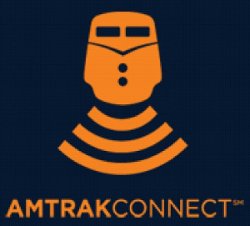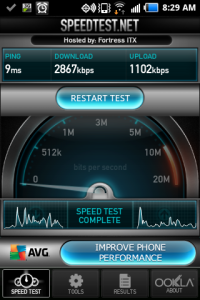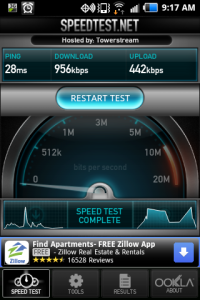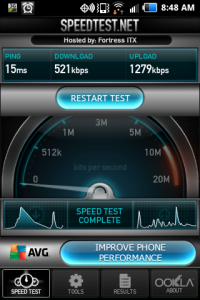My experience with AmtrakConnect free WiFi
 Prior to this most recent trip, it had been about a year since I last traveled aboard an Amtrak train. I recently went home to visit family, which consisted of a ride from 30th Street Station in Philadelphia (PHL) to Harrisburg (HAR). Upon reaching the platform, I was excited to see that there was now a WiFi service available aboard the train, dubbed “AmtrakConnect”. Had the signs outside the train not caught my attention, I would’ve surely been informed by the neat “Your seat is now a hotspot” sticker on the window by my seat. Prior to this addition, my train rides were generally boring and either consisted of reading a book (what’s a book?), sleeping, or noodling on my laptop sans-internet. But that is no more! My total round trip was about three hours, so that gave me plenty of time to play with the new service and do some testing.
Prior to this most recent trip, it had been about a year since I last traveled aboard an Amtrak train. I recently went home to visit family, which consisted of a ride from 30th Street Station in Philadelphia (PHL) to Harrisburg (HAR). Upon reaching the platform, I was excited to see that there was now a WiFi service available aboard the train, dubbed “AmtrakConnect”. Had the signs outside the train not caught my attention, I would’ve surely been informed by the neat “Your seat is now a hotspot” sticker on the window by my seat. Prior to this addition, my train rides were generally boring and either consisted of reading a book (what’s a book?), sleeping, or noodling on my laptop sans-internet. But that is no more! My total round trip was about three hours, so that gave me plenty of time to play with the new service and do some testing.
I sat roughly in the middle of the train car, and had with me both my HP laptop and Android phone. Upon connecting to the network, I was prompted with a page displaying the terms of service, and the connection restrictions. Apparently the internet signal is supplied by 3G/4G towers in the area, so the restrictions are understandable especially when you consider the number of passengers aboard who share the connection. These restrictions consisted of disabling streaming audio/video, and no file downloads over 10MB. That said, I didn’t hesitate to test the restrictions myself. Sure enough, no video and no >10MB files.
Aside from the obvious restrictions, it would appear that Amtrak took some additional measures to avoid network abuse. I used the open port checking tool at www.canyouseeme.org to find that port 21, 22, and 80 are blocked. I didn’t test any others, but if you were planning to host a website or have someone SSH into your machine while aboard the train, you might want to find another strategy. Though those incoming ports were blocked, I was still able to SSH out to my remote server which hosts on a non-standard port.
The signal strength was more than adequate, displaying 1-2 of 3 bars on my phone and 3 of 4 bars on my laptop. The actual internet connection didn’t noticeably drop out at any point during the trip, but the bandwidth available was anything but consistent. This isn’t really surprising considering it’s a wireless signal being received by a vehicle moving at high speed, and sucked away by a train full of passengers. I tested the speed at several different points during the trip: while out in the country and when nearing Philadelphia. I was hoping the speed would improve as we neared the City, but it didn’t change much at all. That in mind, the connection was still considerably faster than the 3G connection available from my phone alone so even if you get a good 3G signal wherever you’re travelling, you’re probably better off using AmtrakConnect.
While the graphs above appear sporadic, my actual experience with the connection was great. Pages loaded quickly, IRC and Facebook chat kept up to date without huge variances in latency and I was able to log into my college’s website to download some (<1MB) PDF’s I needed to read for class without any issues.
Overall, I’m very pleased with the AmtrakConnect service and am very grateful that Amtrak implemented it. Business people, college students, and nerds alike should find their long train journeys far more productive now, at least where an internet connection is necessary. Of course if your idea of “productivity” is perusing Facebook for the duration of your ride, you can do that too.







Brandon,
We wanted to thank you for this blog post on AmtrakConnect. You expressed great insight on how our WiFi service works. We are continuously working toward improving our WiFi service, and we really appreciate your feedback. We hope to see you onboard our trains again soon!
Amtrak Wi-Fi Team
Cannot get on amtrakconnect. On train 93 now then train to Delray Beach. How do I get on to see the stations map and next stop etc. I got on when I first got on train and now cannot find it.
That is a great question, and unfortunately I do not know the answer! I haven’t been able to Google which page it sends you to, so your best bet might be to bookmark the page when you first get on the train and see it. If you disconnect+reconnect to the Wifi it’s possible that it will be shown to you again, but I’m not sure. I’ll remember to figure this out when I’m on the train next in a few days!
I’m on an Amtrak train now, it looks like http://www.amtrakconnect.com/index2.php is the page you want. It has the train information, map, and all that good stuff.
Happy travels!
Riding the Amtrak now and googled the ports. I found port 22 is working. 21 is no dice!